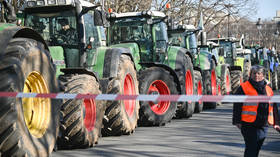Poles unhappy with government’s handling of farmer protests – poll

Almost 50% of Polish people think their government has failed to handle ongoing widespread farmer protests, a recent survey has shown. Respondents to a survey assessing the first 100 days of the country's government also expressed dissatisfaction at how long the new coalition is taking to fulfill promises it made during the recent election campaign.
Polish farmers have been staging regular protests across the country, maintaining continuous blockades of border crossings with Ukraine since January. Farmers oppose restrictions placed on them under the EU's Green Deal and the continued flow of duty-free Ukrainian agricultural products, which they claim threatens their livelihoods.
Despite the authorities in Warsaw making certain concessions in a bid to appease the demonstrators, agricultural workers have refused to relent, arguing that the issue of unfair competition from cheap Ukrainian produce has not been fully addressed.
Polish legal and business daily Dziennik Gazeta Prawna reported the findings of a poll on Wednesday, conducted by the United Surveys research center between March 8 and March 10, surveying 1,000 Poles on the performance of Prime Minister Donald Tusk’s government.
According to the newspaper, 47% of respondents described the cabinet’s response to the farmers’ protests as a “defeat,” with 32% saying the measures adopted had been sufficient, and 21% giving no clear answer.
Some 52.2% said they were unhappy with the slow pace of the implementation of electoral promises made by the incumbent government.
On Wednesday, tens of thousands of farmers descended on multiple Polish cities, including Warsaw, obstructing traffic on key roads and highways with their tractors and other heavy machinery. The organizers had vowed to “paralyze” the entire country.
According to local media, several roads leading to the German-Polish border were also blocked.
Police had previously estimated that 70,000 people would take part in more than 580 separate rallies across Poland on Wednesday.
Similar protests have taken place in several other EU countries since the start of the year.
Meanwhile, EU leaders provisionally decided to extend duty-free access to its markets for Ukraine until June 2025. The agreement includes an “emergency brake” on imports of poultry, eggs, sugar, oats, maize, groats, and honey, should those exceed the average levels of 2022 and 2023.
Polish farmers have opposed the move, insisting that years prior to the start of the Ukraine conflict, when volumes were much lower, should be used as the reference point.













